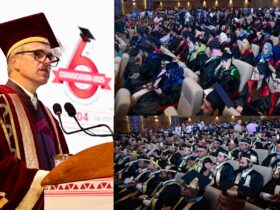MUHAMMAD TAUSEEF
USA got independence on 4th of July in 1776 and after getting independence developed as a democracy. Gradually after getting its independence, its various heads of the state (country) and other leaders at the helm of affairs incepted a system of getting political appointees to head, govern and run the various offices of the government. The appointments were distributed as political rewards and bounties by the politicians/leaders to those who were related to them, close to them or helped them in one way or the other to come into power. This system of nepotism or political appointment came to be known as the ‘spoils system’ or ‘patronage system’. Spoils system as a phrase came from a speech by Senator William L. Marcy of New York. Who while defending the actions of the Jackson administration in a speech in the U.S. Senate, stated, “To the victors belong the spoils.” As such, it was the practice of hiring and firing federal workers when presidential administrations changed in the 19th century. The practice broadly began during the administration of President Andrew Jackson, who took office in 1829.
On a closer look at the contemporary political history of America, one can easily discover that the process of appointing loyalists to the office dates back right to the era of George Washington, but during the Jacksonian era the practice and system of firing of the officials who were regarded as political opponents and appointing the loyalists to the office at their place became an official policy. The said policy was very well praised by the supporters of Jackson especially those who yielded benefits out of the same but was opposed and criticized by the intellectual class as well as the masses. Reports and estimates of that time claimed that as many as 700 government officers lost their jobs in1829 alone (the year when Jackson took up the Presidency). It was nothing but a manifest malpractice and misfeasance of rewarding loyalists and political supporters with federal jobs.
The best gift that this system yielded to America was widespread unemployment and frustration among the youth especially the educated youth. It also triggered revolutionary movements all around the ‘States’ against this undue and corrupt practice. Redressals to this corrupt and anti-merit practice were made only after a dismayed and frustrated Job seeker by the name, “Charles Guiteau” shot down the then President of America “James Garfield”, (who later died of the injury) at a railway station in Washington D.C. It was only after this incident that the people at the helm of affairs realized the negative impact and gravity of the tragedy of ‘Spoils System’ and brought in the Pendleton Act (1883) to redress the issue and made provisions to also give space to merit and worthiness of being eligible for the office. The Pendleton Act followed by the civil service reforms reduced the influence and presence of Spoils system in the administration and federal jobs to a great extent but the cancer of ‘political appointment’ still ails USA which till date has the honour of having the maximum number of political appointees in any of the industrialized democracies. Rough estimates suggest the number to be approximately to the tune of 10000.
But as things are shaping very soon that feather might be taken away from the cap of USA and tucked into the crown of J&K. As the Government is contemplating and trying to the hilt and the edge to actualize a new recruitment policy which in turn would be a gigantic platform of political appointments and nepotism. The government has been highlighting the recruitment policy as a new policy of recruiting youth and making employments. The PDP- BJP coalition has been maintaining that this system would be effective. But somewhere down the line a closer analysis of the policy would analogise it to the spoils system of USA. A policy that damaged the US merit system and created widespread unemployment among the educated and deserving youth. It took a civil revolution including the death of a President of USA to do away with the boom of the cancer of political appointments.
The new recruitment policy of J&K would be nothing less than the reincarnation of the said Spoils System that would demolish fair play and murder the merit of candidates. This modern and improvised manifestation of Spoils System would wreck havoc to the lives of educated and meritorious youth of the state. As this system was potent enough to create widespread unemployment among educated and meritorious youth in USA it would no doubt deal similar blows if not more to the youth of the state. The new recruitment policy as such is aimed at making appointments for both gazetted as well as non-gazetted posts but on contractual basis. This means that it would keep the candidates hanging in air for 7 long years and those who fail to make it destroy their careers and waste their precious 7 years. It is going to have a very destructive and damaging impact on the careers and lives as well as families of those people who are rendered jobless after 7 years of service. The wastage of 7 precious years of youth and the extent of mental trauma therein and the consequences it would lead to might not be hard to imagine for anyone.
Moreover the appointments are going to be made on district levels, making the issue all the more murky and faulty. Also, it further empowers the government to lay down a policy for making appointments against the notified posts on regular and contractual basis in the prescribed manner and also equips it to prescribe the mode of selection for such notified posts. A simple thought at these points even by a layman would tell him how vulnerable this policy is going to be to nepotism, corruption, favouritism and much more.
The biggest point of worry is that this policy aims at bypassing the already established recruitment agencies like PSC, SSB, etc. In the absence of a specialized and neutral recruiting agency the probability of corruption, nepotism, clandestine and backdoor employments increases all the more. So, at a time when J&K has already been among the toppers of the merit list of corrupt states released by “Transparency International” this policy would be cogent enough to further skyrocket its ranking in the list. Can the state afford such things at this moment of time, is for the stakeholders to think and ponder upon?
Also, this policy which is going to find its operative ground in the District headquarters would without a doubt be vulnerable enough to turn into a den of political favouritism and appointment mafias. Moreover, it would certainly deal two more big jolts to the state at large and the masses in particular. Firstly, like it did in USA it would kill the merit as a policy in J&K state too. In a scenario when there is high probability of political favours, nepotism, favouritism, corruption, mafia involvement in this policy; the survival and sustenance of merit, qualification, eligibility in such a scenario are very bleak if not zero.
Secondly, when the appointments are going to be carried out at the district levels it can create divides in the state for sure. Confining people within their districts is tantamount of preparing the breeding ground for mutli-factionalism and intra-regional divide. This policy is cogent enough as such to fracture the state into miniature units. The working and service of people in different parts of the state is essential to develop cohesiveness and esprit-de-corps among the citizens of the state. The confinement of the people to their respective regions is going to undo that cohesive bond between the masses of the state and alienate them from their fellow citizens. The future of the state under such a situation must not be hard to imagine.
Moreover, an intra district recruitment would create multiple opposing and offsetting lobbies at Mohalla, village, Tehsil levels where one village or Mohalla or Tehsil would feel left out compared to the other. The indictments of pick and choose would surface day in and day out, even if not valid. This feeling can anytime vitiate the milieu of the state. Also when the meritorious and worthy youth get left over and don’t get employed it would highly demoralize, discourage them and further alienate them. An incessant growth in the alienation and frustration of the youth of the state is the biggest and deadliest misfortune that can strike it. An already trouble torn state can imagine of nothing worse than an alienated, demoralized and frustrated younger generation. Also in a state of affairs when the inertia of nepotism, political favouritism and corruption is the order of the day the cream of the human resource would better prefer to move out in search of better opportunities and professional working conditions leading to the highly uncalled for and highly unwanted brain drain of the human resource from the state. So, this brain drain is going to be another advantage that the new recruitment policy is going to gift the masses with.
From the above points, anticipations and analysis it must be pertinent enough for any rational mind to conclude that if this policy is actualized it would turn out to be the deadliest nightmare for the state of J&K. The best thing for the government at this moment of time would be to concentrate on generating employment opportunities in the state by giving a boost to the agriculture and allied sectors, private sector, industrial sector, hospitality sector, infrastructural development etc and let the recruitment be limited within the domain of specialized agencies in an even more effective and transparent manner and endeavour to reduce the spaces for corruption, nepotism and political favouritism to develop.


















Leave a Reply